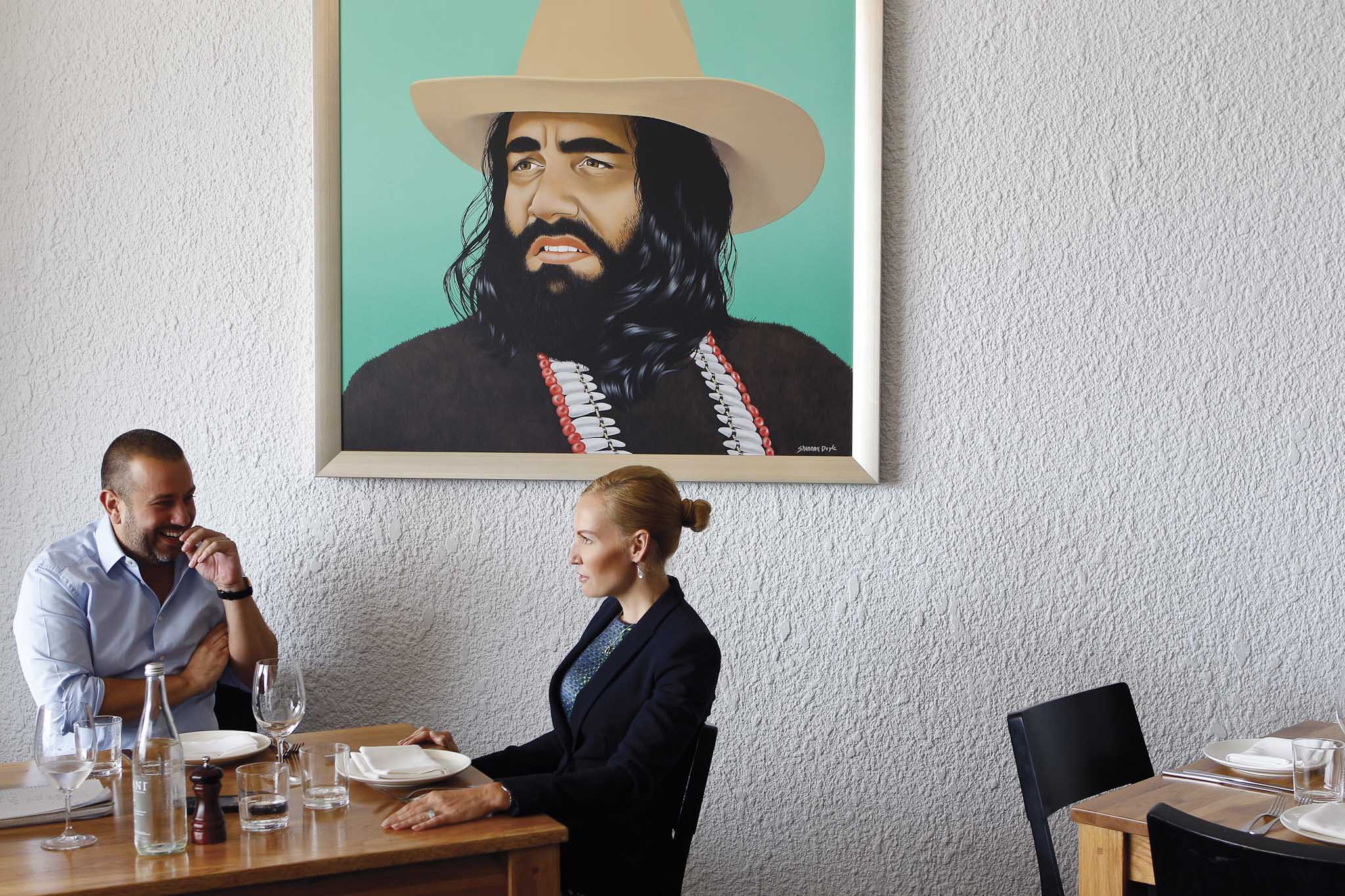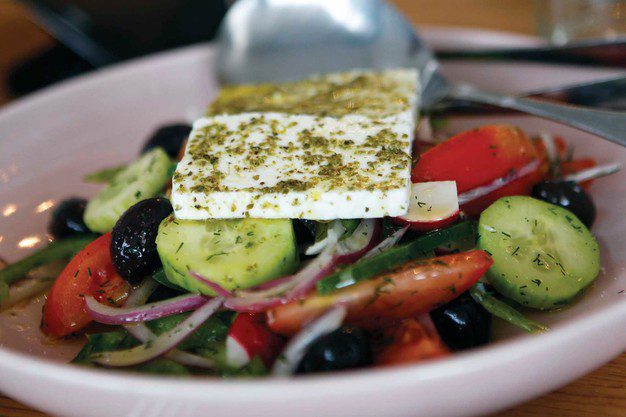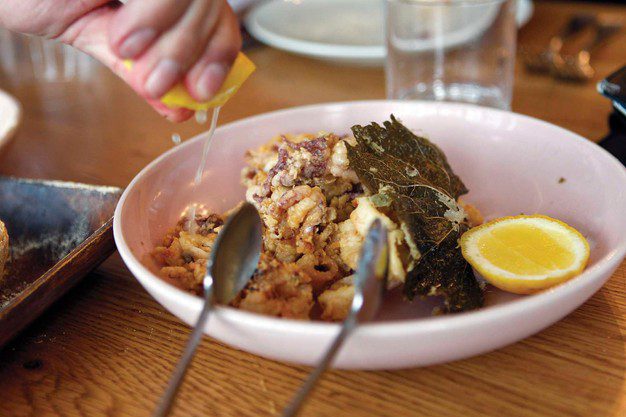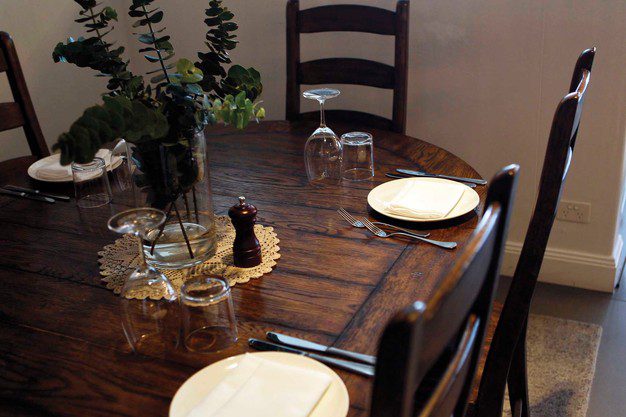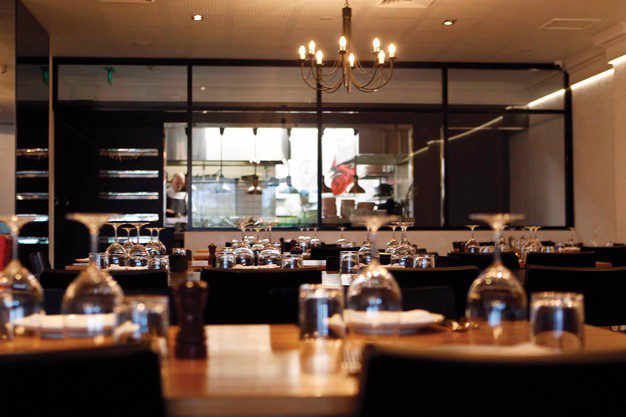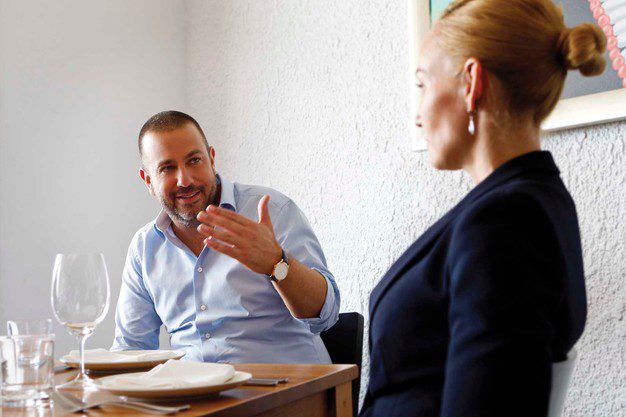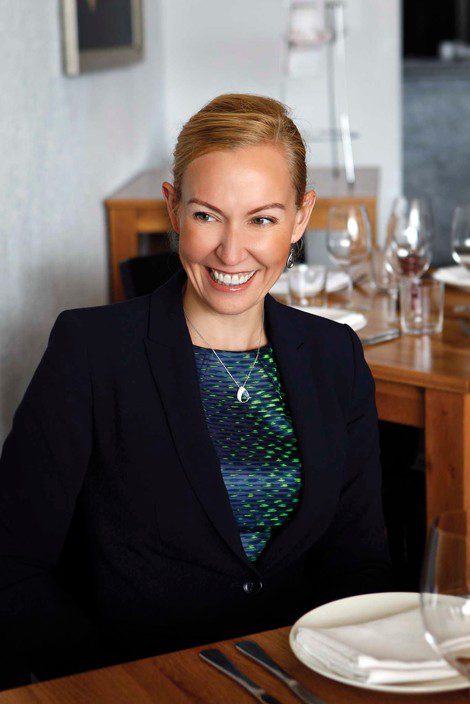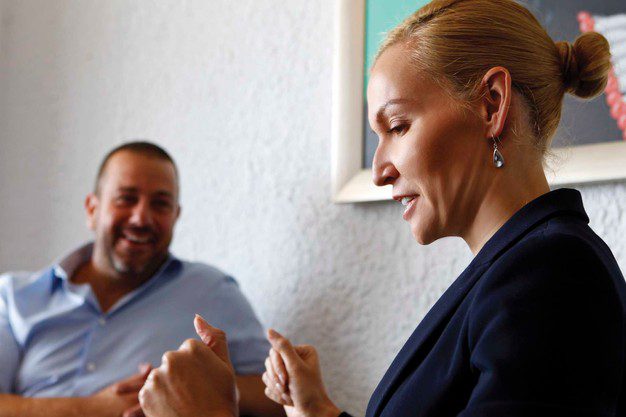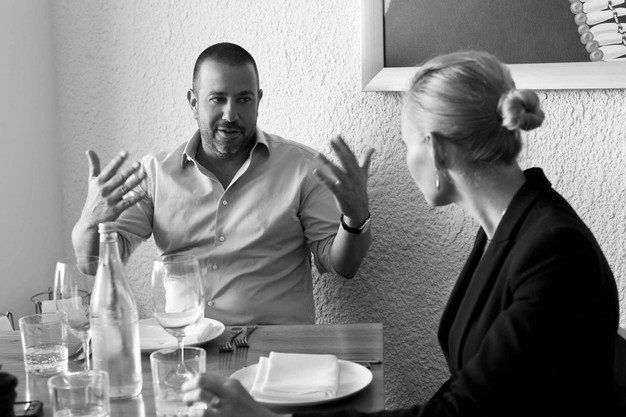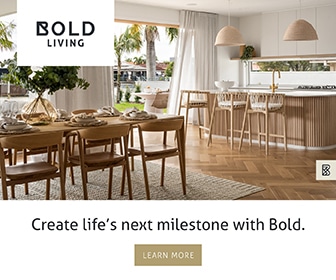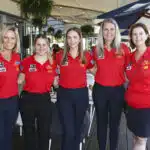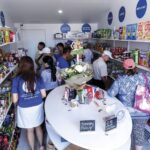GOURMET
Living the GC dream
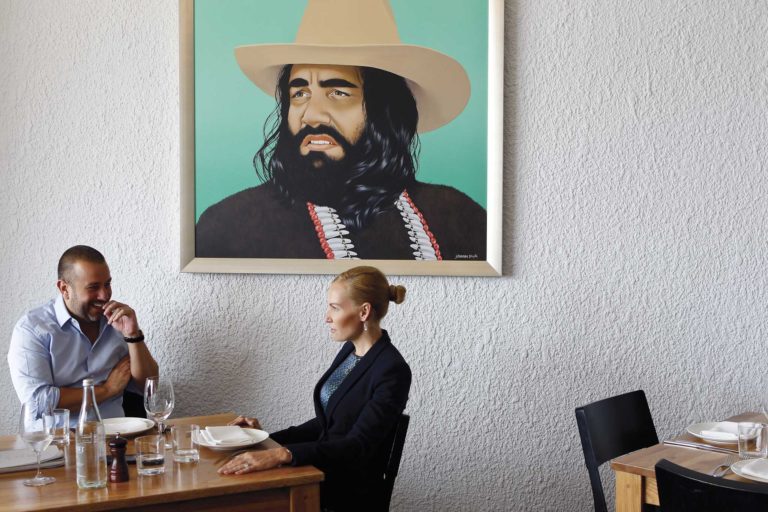
WORDS: PHOTOGRAPHY
A beaming Annaliese Battista, the Gold Coast’s vibrant new tourism boss, breezes into Hellenika in a smart black business jacket and shimmering turquoise metallic-look dress that shows of her runner’s legs, toned from pounding the pavement along the foreshore at Mermaid Beach where she has settled with her family after accepting what is arguably the city’s most important job. Since being appointed to the role of CEO Destination Gold Coast (aka Gold Coast Tourism) in August, the vivacious Perth native has impressed the city’s movers and shakers with her energy and enthusiasm to take our lifeblood tourism industry to the next level.
Ocean Road caught up with Annaliese for the latest in our series of lunchtime chats with Hellenika owner Simon Gloftis and the other influencers helping to shape the Coast and steer it into an exciting new future.
Annaliese Battista says she wasn’t looking for a new job when she happened to glance over her chief financial officer’s shoulder as he flipped through the Financial Review in the City of Perth offices earlier this year and spied an ad for CEO of Destination Gold Coast.
She’d been a senior executive with the Perth council for almost three years, mostly as director of Economic Development and Activation but also briefly as acting CEO after a tumultuous period of internal upheaval at the municipal authority.
Named WA’s top public relations graduate in 1999, she had previously held senior communications roles with the likes of the WA Local Government Association, City of Subiaco, and the Royal Australian Air Force.
“I wasn’t actually looking for a job, but I’ll tell you the story,” she responds when Simon asks how she came to pack up her family and move 4000km across the continent for a new life on the Gold Coast.
“My chief financial officer had the habit of reading the Fin Review every lunchtime. He had his packed lunch and you just didn’t interrupt him when he was reading his Fin Review, except I did to ask him cheeky questions.
“Anyway, he had his Fin Review open — horrified that I’d actually interrupted his lunch break — and there was an ad for the role of CEO of Gold Coast Tourism, trading as Destination Gold Coast. I looked at it and I thought, ‘That can’t be a job… Are you serious?’ I had a bit of a joke with him and said, ‘If you’re not going to go for it, I am’.
“And I did — I thought what an absolute job in paradise! I did my homework and discovered that not only was it a real job, but getting it was a really aggressive, competitive, intensive recruitment process, a bit like Hunger Games.” She laughs.
“A few months and several interviews later,” she continues, “after EQ testing, IQ testing, and anonymous interviewing of my [City of Perth] staff, I got the job. I didn’t think twice about the move — this is absolutely my favourite place in Australia and has been for many years. And the potential of the Gold Coast, from where we’ve come to where we’re headed, is just extraordinary.”
‘Bold’ is a word Annaliese uses often to define the direction in which she wants the Gold Coast tourism industry to go, and she reckons Simon is a perfect example of that with his visionary thinking in establishing Hellenika at Nobby Beach nine years ago, long before the beachside suburb became the hip bar and dining destination it is today.
“Something that really resonates with me about that is it was bold,” she tells Simon.
“You were obviously an innovator back then. Gold Coasters are naturally really proud, and rightly so. We have the best man-made assets, we’ve got the best natural attractions, the foodie scene is booming… Think about what it’ll be like in five years.
“But the trick, I think, in selling the Gold Coast as a tourism destination is to go from being proud to being bold. And to make statements like opening a Greek restaurant at Nobby Beach nine years ago when a lot of people would have thought you probably had a screw loose.
“But you weren’t [crazy] — you were bold and innovative and you believed in what was here. And I certainly did to move 4000km to do this job.”
Annaliese says while she looked after Perth’s destination marketing, her broader focus was economic development and that is essentially what the tourism industry is all about.
“The reason I love economic development is that’s how you build communities,” she says. “It’s the thing that gets me out of bed every morning — you build the economy and you build a community.
“You make people’s lives better and everybody in the community benefits. On the Gold Coast, that means tourism. Because tourism and hospitality are the lifeblood of the Gold Coast: 42,000 jobs, 20 per cent of the economy, $5.1 billion value to the local economy.”
Simon reckons there’s a “genuine excitement” on the Gold Coast whenever something new comes to the city, be it an attraction, major project, event, or hospitality hotspot.
“Our biggest cities couldn’t dream about the excitement of having something new,” he says. “They wouldn’t know what it’s like to have that genuine excitement.”
“I couldn’t agree with you more,” Annaliese says. “It’s a force of nature.”
Another thing that has struck her about the Gold Coast after several months in her new role is how collaborative the city is, along with a refreshing absence of tall poppy syndrome.
“With the tourism sector, there’s a time to compete and there’s a time to collaborate,” she observes.
“But our sector knows how to collaborate and knows the benefits of hunting in a pack, and that’s something I’m really passionate about.
“The Gold Coast has that strong sense of backing people in when they’re having a go and not cutting them down if they fail. Because you’ve got to try things and stuff it up occasionally to get real progress.”
Simon: “Coming from another state, why do you think we get some negative press on the Gold Coast? I hear it all the time and I hear funny stuff like, ‘This restaurant’s [Hellenika] quite good; it could probably work in Melbourne’. I think to myself, ‘Thanks so much’. I had one of my main suppliers actually say to me, ‘You know, we have this department store [in Sydney] called David Jones’. I said, ‘Where the f… do you think we live?’
Annaliese: “When I took this role, there was a lot of media that was a bit derogatory toward the Gold Coast. It was really fascinating to me [because I was thinking] the joke’s on you; I’m going to paradise. With my white shoes!” She laughs.
Seriously though, she says, the often-maligned Gold Coast stereotype is “really outdated”.
So how do we overcome it?
“You have to use clever marketing and communication and real trailblazers like yourself,” she tells Simon.
“You’re an iconic personality that’s out there bold and proud and promoting the Gold Coast unashamedly. That’s what you have to do. The little brother, chip on the shoulder — there’s no place for that. You have to just get out there and spruik what we’ve got.
“Outdated stereotypes that we’re somehow lacking culture are absolute bulls..t; it’s absolute crap. We have a very strong culture. It’s a beach culture, it’s a collaborative culture, it’s a culture that’s about healthy living and vitality and embracing new ideas. That has exactly the same merit as a city that is known for high arts and performance art.”
Which brings Annaliese to another topic close to her heart: authenticity in marketing.
She notes Simon’s desire to give his customers “the best produce they can eat” and also his mission statement printed in every Hellenika menu: ‘When people come into my restaurant, I believe they are putting their health and well-being into my hands. This is a responsibility I take very seriously’.
“I think that’s really cool; that’s not a typical restaurateur talking, and it really speaks to me,” she tells him. “To use a restaurant analogy, if you promised people a fine-dining, white-glove experience at Hellenika and they came here, they’d probably be disappointed because that is not your product.
“My [Destination Gold Coast] predecessors invested a lot of money in trying to convince people that the Gold Coast wasn’t like the Gold Coast and had all these great coffee shops and laneways and all sorts of stuff. Which we do have, and that surprises and delights people when they’re here.
“But our core offering — beaches, great casual dining, lying by the pool, theme parks, and shopping — there’s nothing wrong with embracing that and being real and being who we are and spruiking it from the rooftops. Play to your strengths and be honest and authentic.
“Authenticity in marketing and promotion is really important. There’s a big trend in international marketing to get back to your roots, and I think that’s definitely true for the Gold Coast.
“As Australia’s fourth-most-visited destination, we just need to get out there and not apologise for all of the great things we have and not try and compete with Melbourne on coffee shops. It’s not going to happen. Why would we — we’ve got other fantastic stuff.”
Annaliese believes the Coast’s health and active culture — particularly with the recent completion of the Oceanway, a 36km beachfront walking and cycling path from The Spit to Point Danger — is poised to become another significant tourism driver for the city.
“As a resident, I’m really surprised and delighted at how active people are,” she says. “Where we live is kind of like a fitness freeway. That’s probably something that’s going to grow and evolve and really be an asset to the Gold Coast in the future.”
She also believes our golden beaches possibly need to be promoted more as part of an “authentic” marketing strategy.
“I’ve looked at what some people compare our competitors to be, like Bali, Phuket … places like that,” she says. “I thought to myself, ‘Really? The beaches in those places are horrible!’ And we have a pristine 53km of end-to-end unspoilt coastline.”
Ocean Road asks Annaliese her view on proposed ‘big-ticket’ projects such as a cruise ship terminal and hinterland cableway.
“My inner economist always wants to see the business case for things like that,” she says. “However, I think the idea of picking a few winners and going after them is really important.
“We can’t have everything. We don’t necessarily need seven dive wrecks, a cruise ship terminal, a cableway. I think you need to be able to demonstrate the real value that those things are going to bring, because they are multibillion-dollar investments most of them.
“The other thing I’d say as a relative newcomer is, yes, you need to build new attractions — and it’s happening when you look at the investments the theme parks and private developers are making — but you also have to think firstly of all the other attractions that we have on the Gold Coast and milk the strengths that already exist. I last counted 135 different attractions on the Gold Coast.
“I just think you’ve got to have those visionary conversations [on new major projects] but you also have to do the business casing on them and make sure that the numbers stack up. The last thing that we need is a white elephant anywhere.”
One project Annaliese is a massive supporter of is the light rail, with planning for the latest stage from Broadbeach to Burleigh Heads well advanced. Simon, who is on the business advisory board for the light rail, says the trams are a “no-brainer” to keep the Coast moving forward, and the Destination Gold Coast CEO couldn’t agree more.
“Anything that improves accessibility and people’s ability to move around the Gold Coast quite easily and cheaply is always going to be a winner,” she says.
As for the dreaded M1, “I try not to talk down the M1 too much in the media,” Annaliese says. “You look at the big cities around the world — Paris, the most-visited — and try and get a car park there or arterial road access there. If you’ve got the offering, people will park on the moon and they’ll find a way to get there.”
An AFL tragic, Simon asks fellow footy fan Annaliese about the Gold Coast Suns and how important they are in promoting tourism.
“The AFL experience is all about entertainment, and the Suns and Gold Coast are such a natural marriage,” she says.
“The Suns already lure thousands of local and interstate AFL fans to the Coast, and that’s only going to increase once they mature a bit and get the player list and have more success on the field. And look at our venue [Metricon Stadium]; it’s fantastic, world-class.
“Coming from an AFL state, I know people will jump on a plane to watch a football game. We’ve got the [tourism] offering with the Suns; we just need to get them cranking!”
Simon: “We probably share a lot of the same philosophies. The authenticity you’re striving for is what I try and do here. That’s a good point that you brought up earlier. We’ve got to own what we’ve got, play to our strengths, and be authentic about it. That’s what we do; that’s who we are.”
Annaliese: “You don’t come to work each day because you want three Maseratis.”
Laughter erupts around the table when it’s revealed Simon does actually own a Maserati — although only the one.
“I like a Maserati,” Annaliese chuckles.
But she guesses (correctly) that owning a luxury car isn’t what gets Simon’s motor running.
“In your heart of hearts, the thing that gets you out of bed in the morning is your commitment to marrying people with the experience that you’re offering,” she says.
“I’m the same — I don’t do what I do for any reason other than I’m really passionate about building great communities. You do that by building the economy.
“The lifestyle here on the Gold Coast is unbeatable, the people here are unbeatable, our experiences are unbeatable. We are living the dream, and we have to just absolutely embrace what we’ve got and get out there and sell it.”


